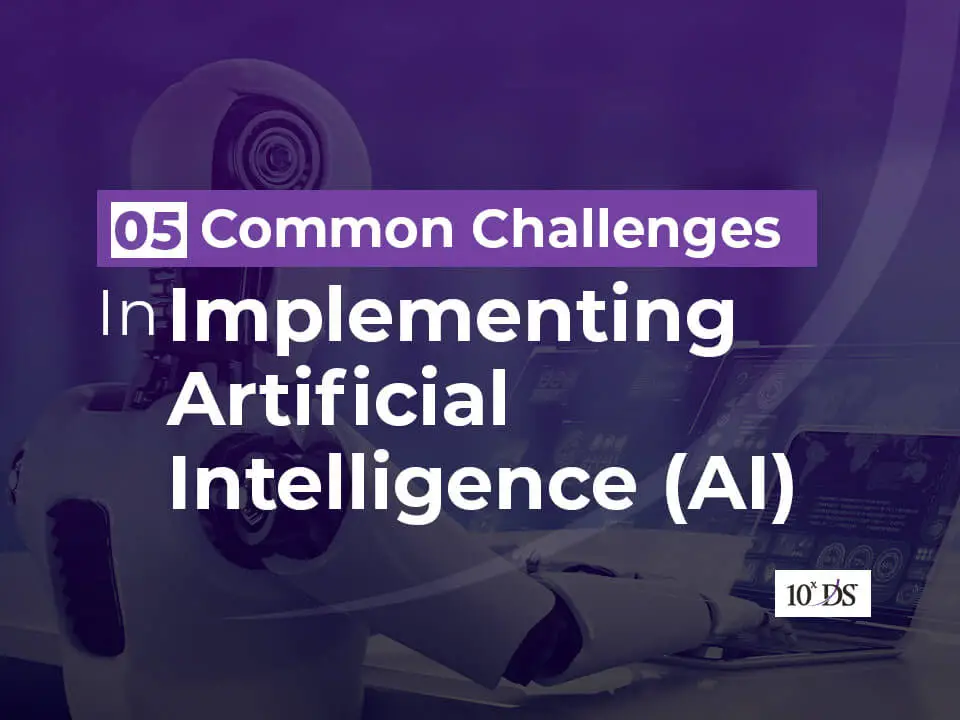Implementing AI in Small Businesses: Strategies and Challenges

Artificial intelligence (AI) is rapidly transforming the business landscape, and small businesses are increasingly recognizing its potential to enhance operations and drive growth. However, implementing AI effectively requires careful planning and execution. Here’s a comprehensive guide encompassing strategies and challenges to consider:

Strategies for AI Implementation:

- Identify Specific Goals: Define clear business objectives that AI can address, such as optimizing customer experience, automating tasks, or improving data analysis.
- Choose the Right Tools: Explore various AI technologies and select those that align with specific needs and business capabilities.
- Start Small: Begin with pilot projects to test the feasibility of AI before making significant investments.
- Invest in Data: Ensure availability of high-quality, relevant data to train and improve AI models.
- Build a Skilled Team: Train employees to understand and utilize AI effectively, or consider outsourcing certain functions to external experts.
Challenges in AI Implementation:
- Cost of Implementation: Acquiring and deploying AI systems can be expensive, particularly for small businesses with limited resources.
- Lack of Expertise: Businesses may struggle to find skilled AI practitioners or resources to support implementation and maintenance.
- Data Privacy Concerns: AI algorithms rely heavily on data, which can raise concerns about data security, privacy, and compliance.
- Bias Mitigation: AI models can inherit biases from the data they are trained on, leading to unfair or discriminatory outcomes.
- Resistance to Change: Employees may be resistant to adopting new AI technologies, fearing job displacement or changes in work routines.
Overcoming Implementation Challenges:
- Secure Funding: Explore government grants, venture capital, or strategic partnerships to finance AI investments.
- Upskill Employees: Provide training and educational resources to equip staff with the necessary AI knowledge.
- Prioritize Data Management: Implement robust data security measures and ensure data quality to support reliable AI algorithms.
- Address Bias: Establish data validation processes and employ techniques like differential privacy to mitigate bias in AI models.
- Manage Resistance to Change: Communicate the benefits of AI to employees, engage them in the implementation process, and provide support throughout the transition.
By carefully considering these strategies and challenges, small businesses can effectively harness the power of AI to improve efficiency, drive innovation, and gain a competitive advantage in the modern business landscape.Implementing AI in Small Businesses: Strategies and Challenges
Executive Summary
Artificial Intelligence (AI) has revolutionized various industries, and its impact on small businesses is becoming increasingly significant. By adopting AI solutions, small businesses can enhance operations, optimize decision-making, and gain a competitive edge. However, implementing AI also presents challenges that require careful consideration. This comprehensive guide explores strategies for successful AI implementation in small businesses alongside potential challenges and recommendations to overcome them.
Introduction
The rapid advancements in AI have opened up a multitude of opportunities for businesses of all sizes. For small businesses, AI offers the potential to automate tasks, improve customer experiences, and drive data-driven decision-making. However, implementing AI can also be daunting, requiring a thoughtful approach to ensure successful adoption and value realization.
FAQs
1. What are the benefits of implementing AI in small businesses?
- Enhanced operational efficiency through task automation
- Improved customer service and engagement
- Optimized decision-making based on data analysis
- Increased sales and revenue generation
- Competitive advantage over non-AI-adopting businesses
2. What are the challenges of implementing AI in small businesses?
- Limited resources and budget constraints
- Lack of technical expertise and AI knowledge
- Ethical considerations and data privacy concerns
- Potential job displacement and workforce concerns
- Requirement for high-quality data for effective AI models
3. How can small businesses prepare for AI implementation?
- Identify specific business needs that AI can address
- Conduct thorough research and explore available AI solutions
- Start with small-scale pilot projects to test and learn
- Address ethical and privacy concerns proactively
- Invest in training and upskilling for employees
Subtopics
1. AI for Task Automation
AI-powered automation can significantly reduce repetitive and time-consuming tasks, freeing up valuable time and resources for more strategic business activities.
- Automated customer service: Chatbots and virtual assistants handle customer inquiries, freeing up human agents for more complex interactions.
- Automated data entry and processing: OCR and AI-powered tools automate data capture, entry, and processing tasks, reducing errors and improving efficiency.
- Inventory management and order processing: AI optimizes inventory levels, automates order fulfillment, and tracks shipments, enhancing supply chain efficiency.
2. AI for Data Analytics and Insights
AI algorithms analyze vast amounts of data, identifying patterns, trends, and anomalies that would be difficult for humans to detect. This provides valuable insights to drive informed decision-making.
- Predictive analytics: AI models predict future outcomes and trends, enabling businesses to make informed decisions about product development, marketing campaigns, and resource allocation.
- Customer segmentation and targeting: AI clusters customers based on behavior and preferences, allowing businesses to personalize marketing efforts and improve customer engagement.
- Fraud detection and risk management: AI identifies suspicious transactions and activities, protecting businesses from fraud and financial losses.
3. AI for Customer Service
AI-enhanced customer service offerings deliver personalized experiences, resolve issues faster, and increase customer satisfaction.
- Virtual assistants: Provide 24/7 customer support, answering questions and resolving issues through natural language processing.
- Sentiment analysis: AI analyzes customer feedback, identifying areas for improvement and optimizing the customer experience.
- Chatbot-based customer support: AI-powered chatbots engage customers in real-time conversations, automating support processes and improving response times.
4. AI for Marketing and Sales
AI leverages data and algorithms to optimize marketing campaigns, personalize content, and increase sales conversions.
- Personalized marketing: AI identifies customer preferences and behavior, enabling businesses to deliver tailored marketing messages and offers.
- Lead generation and qualification: AI-enabled lead generation tools identify potential customers and qualify them, saving time and effort for sales teams.
- Sales forecasting: AI models analyze sales data, identifying trends, predicting future sales, and optimizing inventory levels.
5. AI for Cybersecurity
AI provides advanced protection against cyber threats by detecting and responding to malicious activities in real-time.
- Intrusion detection and prevention: AI identifies and blocks unauthorized access, malware, and other threats to protect data and systems.
- Phishing and spam detection: AI algorithms analyze emails and other communications, identifying and filtering out phishing attempts and spam.
- Security threat intelligence: AI collects and analyzes data on emerging threats, providing insights for businesses to enhance their cybersecurity posture.
Conclusion
Implementing AI in small businesses can unlock transformative benefits, but it also presents challenges that require careful consideration. By understanding the potential of AI, selecting appropriate solutions, preparing for implementation, and addressing ethical concerns, small businesses can harness the power of AI to accelerate growth, improve customer experiences, and gain a competitive edge in the modern business landscape.
Keyword Tags
- AI in Small Business
- AI Task Automation
- AI Data Analytics
- AI Customer Service
- AI Cybersecurity
